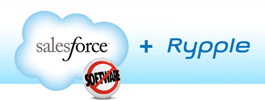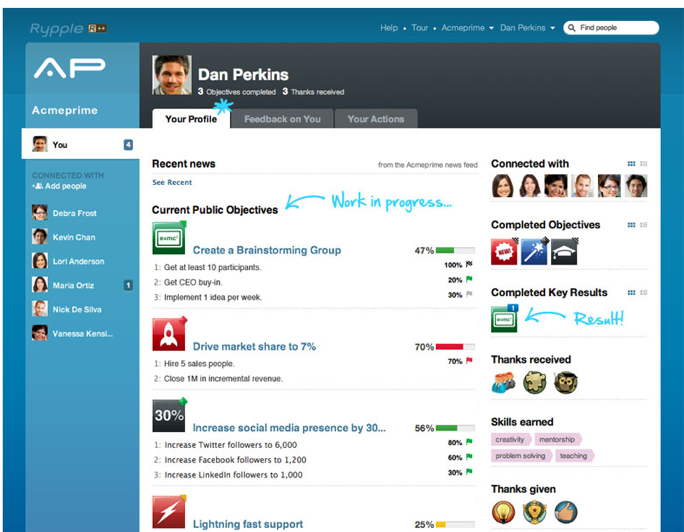Yesterday, Salesforce announced the acquisition of social performance platform Rypple, and revealed that it will be entering the human capital management (a.k.a. employee and talent management software) market with the launch of a new product Successforce. For Salesforce, the announcement of a new product vertical and the entry into a new market is a big deal. And when you consider SAP’s recent $3.4 billion acquisition of talent management software giant SuccessFactors, things start to get interesting.
We sat down with Salesforce EVP John Wookey, who will be leading Successforce and is a former SAP and Oracle alum; as well as Daniel Debow, co-CEO and co-founder of Rypple; to discuss what the acquisition means for Salesforce.
For background, Rypple is a social performance management platform that helps managers and employees improve performance. Essentially, Rypple replaces the traditional performance review with a more social and collaborative approach. The software has been compared to a “Zynga for the enterprise,” and allows managers to track projects, guide their team and give kudos to deserving staff for others to see within its online application.
Rypple also employs various game mechanics, like badges, which can be custom-built to reflect a company’s own values. And employees can rack up “skills earned,” in a method reminiscent of building up a character in a virtual world or MMORPG, for example. The company’s software is used by Facebook, Spotify, Gilt Groupe and others.
Wookey explains that the entry in the human capital management software market, which he says is a $6 billion yearly market opportunity, fits in with Salesforce’s overall goal of making the enterprise more social “There’s been a focus on the social enterprise but this also needs to work within the organization internally, and this has to has to begin with a company’s people and talent,” he explains. “It’s not just about human capital management, it’s about how to use concept of social enterprise to effectively manage people. This is the next step in enabling the social enterprise.”
As we explained above, Rypple has been pushing the envelope when it comes to bringing social actions into the talent management space. Debow tells us that the world of work has changed but the process used to manage people has not changed at all, and dismisses SuccessFactors as being part of the old guard of talent software that basically automates forms of business but not behaviors.
 “Rypple amplifies behaviors that drive real performance,” Debow says. When it comes to coaching, goal setting, evaluations, and more, we are helping drive performance by actually replicating many of the social actions people take in their lives.” He uses an example of working with Spotify recently to help with goal setting. With a new ‘social goals 2.0,’ product, Rypple helped Spotify work with employees to evaluate how to use objectives and results to drive the business forward. Users could create objectives and goals for Spotify, invite people to comment, and commit to an objective, Debow explains.
“Rypple amplifies behaviors that drive real performance,” Debow says. When it comes to coaching, goal setting, evaluations, and more, we are helping drive performance by actually replicating many of the social actions people take in their lives.” He uses an example of working with Spotify recently to help with goal setting. With a new ‘social goals 2.0,’ product, Rypple helped Spotify work with employees to evaluate how to use objectives and results to drive the business forward. Users could create objectives and goals for Spotify, invite people to comment, and commit to an objective, Debow explains.
“The fact is that we built the product with some of the more social organizations on the planet, including Facebook,” he says.
Wookey says that as Salesforce was evaluating its entry into human capital management, the company did look at the potential competitors and saw that there is a lot of software that people aren’t happy with, and decided that the social approach is going to grow the market. “There’s a natural synergy between social actions and how you effectively align awards, learning systems, help employee career paths and support individual talent,” he adds.
While Salesforce still needs to launch Successforce and integrate Rypple fully, the company already has plans for integrations into existing Salesforce products like Chatter, the Sales Cloud and more. Debow says that integrations will include the ability to work with Chatter, CRM and other products to track completion rates or work and record this into Successforce.
Salesforce probably didn’t drop as much cash as it did with Radian6’s $326 million acquisition, but that doesn’t mean it’s not putting massive amounts of resources into making the acquisition a new business for the CRM giant. After talking to both Wookey and Debow, it’s clear that Salesforce has major ambitions for social human capital management as a new product and revenue line (Wookey is optimistic on the revenue front).
But if Wookey’s estimates of a $6 billion human capital management market are right, this could end up being a significant new source of growth for Salesforce.

